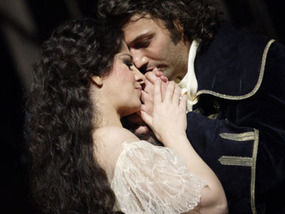|
 ALL
opera with a ridiculously convoluted plot, that has not been performed at
Covent Garden since 1906, written by a composer you have probably never
heard of, may not sound very appealing, but the Royal Opera has pulled out
all the stops for this production of Francesco Cilea's Adriana Lecouvreur
and the result is nothing short of sensational. ALL
opera with a ridiculously convoluted plot, that has not been performed at
Covent Garden since 1906, written by a composer you have probably never
heard of, may not sound very appealing, but the Royal Opera has pulled out
all the stops for this production of Francesco Cilea's Adriana Lecouvreur
and the result is nothing short of sensational.
First there is the
cast. Having Angela Gheorghiu in the title role should be enough reason for
anyone to want to see this production. She not only has the most beautiful
and passionate soprano voice on Earth, but is also a consummate actress.
With total control, she can belt out angry arias, exude passion in romantic
duets, go mad or die in a whisper that fills the huge hall – all of which
are called for in the role of Adriana. Yet to judge from the
ecstatic applause at the end of the first night, the audience vote went not
to Gheorghiu but to the German tenor Jonas Kaufmann who took the role of
Maurizio, Count of Saxony and sang it absolutely beautifully.
Kaufmann is, in the opinion of many, the world's greatest currently
performing tenor and on the basis of this performance, it is difficult to
disagree. The clarity and power of his voice are awe-inspiring, and the
quality of his singing seemed to get better and better as he increased the
volume. His is a truly stunning voice. Gheorghiu and Kaufmann together, as a
pair of lovers, looked the part and sounded divine. When the opera ended
with his heart-rending aria as she died in his arms, the whole audience must
have felt mesmerised and emotionally drained.
With such
superb singers in the leading roles, it must have been easier than usual to
recruit a good supporting cast, but the Royal Opera have again outdone
themselves. Michaela Schuster was outstanding as the Princess de Bouillon,
who is Adriana's rival for Maurizio's love. Looking every inch the wicked
and powerful princess, she exudes hostility and venom, particularly when
trading insults with her rival. Alessandro Corbelli was also excellent as
Michonnet, stage manage of the theatre where Adriana performs, besotted with
the girl, but unable to express his love.
Not only was there not a
single weak link in the cast, but David McVicar's production, aided by
sumptuous sets designed by Charles Edwards, also brought out the splendour
of 18th century Paris in which the story is set, and helped tell the story
as the action switched between theatre, backstage and Palace.
Finally, there was the Covent Garden orchestra, conducted by Mark Elder who
are never less than excellent, but on this occasion were better than I have
ever heard them. Particularly in the prelude to the final act, where the
strings and wind sections are engaged in a beguiling conversation, their
variations in dynamics brought out the depths of the composer's Puccini-like
music and revealed its high quality.
So why, you may wonder, have we
not seen this opera for a century? The answer lies in a combination of the
composer's unjust obscurity (caused mainly by his being overshadowed by
Puccini himself), and the silliness of the plot.
Like many operas,
it comes down to tenor meets soprano, they fall in love, problems arise, and
they reconcile just before the soprano dies, but despite the fact that it's
based on a true story, the convolutions in Adriana Lecouvreur make it hard
to follow. Quite apart from the main love triangle, there are other
infidelities and rivalries going on, all compounded by mistaken identities,
disguises and a totally unbelievable poisoning plot (inhaled from a casket
of violets) to dispose of Adriana at the end.
But with singing like
this, who needs a plot? The Royal Opera House are to be congratulated on
digging this opera out of obscurity and sparing no effort to provide the
treatment it deserves. They have given us many treats this year,
delightfully mixing old favourites with new productions and rediscoveries of
forgotten works, but this production of Adriana Lecouvreur is as perfect as
anything they have done. An utterly memorable evening.
Verdict: 5/5
|